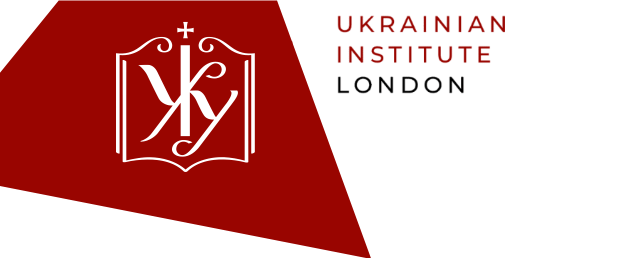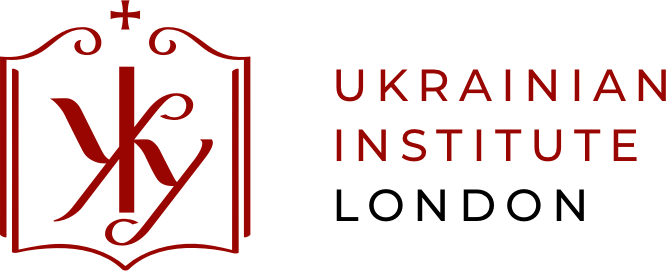A panel discussion at Chatham House on 10 April 2019 considered Ukrainian culture policies and how culture relates to wider issues such as education, resilience and coping with the consequences of the war in the Donbas.
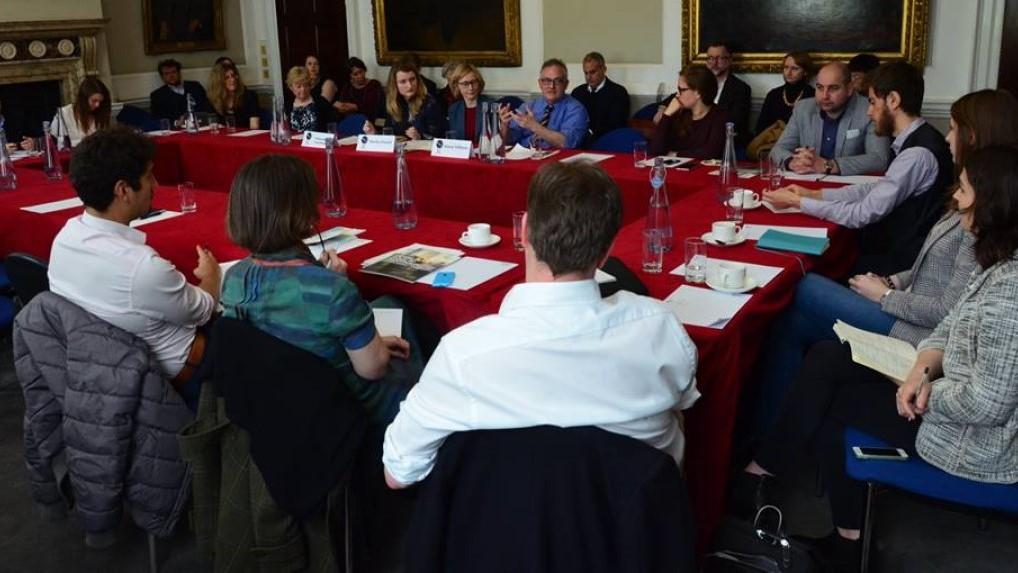
AUTHOR
Marina Pesenti, Director of the Ukrainian Institute London and moderator of the panel “Can culture help people cope with instability?” at Chatham House, 10 April 2019.
Among the many changes which have taken place in Ukraine in recent years, the revival of its arts sector and a concerted effort to launch systemic cultural policies are some of the most inspiring, albeit seldom noticed in the West. Triggered by the ongoing conflict with Russia, Ukraine has been through an intense process of self-rediscovery, as well as constructing its identity, and its artistic community and grassroots creative class have found themselves at the forefront of these changes.
“Can culture help people cope with instability?” was the panel organised by Chatham House’s Ukraine Forum that took place in London on 10 April 2019. The speakers – Simon Williams, Director of British Council Ukraine, and Oleksandra Yakubenko, Head of the International Cooperation Department at the Ukrainian Cultural Foundation – looked at revolutionary developments in Ukraine’s culture policies and at the impact of western “soft power” institutions on these processes, and discussed the relationship between culture and the wider issues of education, resilience and coping with the consequences of the war with Russia in the Donbas.
An ambitious soft power programme is being pushed forward by the Ukrainian government.
In Ukraine, cultural and creative industries constitute 4% of GDP, which is comparable to western economies, as Simon Williams pointed out. He outlined an ambitious soft power programme being pushed forward by the Ukrainian government inside the country, including revamping its education system, developing an independent broadcaster and arts and cultural sector, and supporting the state language.
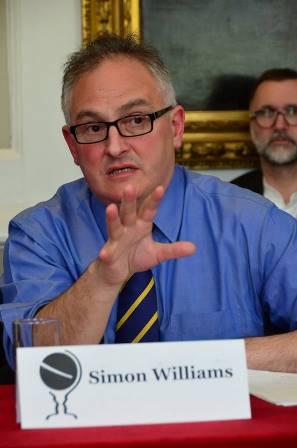
British Council Ukraine is supportive of Ukraine’s European ambition, said Simon Williams, and sees its role as “giving Ukrainians the skills and education they need to thrive, and to make their own choices.” In the cultural field alone, British Council Ukraine covers a sizeable brief, which includes training programmes for cultural managers and creative entrepreneurs, advising the government on the reform of its soft power institutions, administering “Culture Bridges” – the most ambitious EU programme for cultural exchanges in Ukraine to date, which has disbursed 1.3m euros in funding. (“Culture Bridges” is to be replaced by “House of Europe” later this year and administered by Germany’s Goethe-Institut).
Photo: Simon Williams, Director of British Council Ukraine, at the event.
“It’s really important for international cultural players in Ukraine to be cognisant of the European policy framework in culture, as this is driving the cultural relationship with Ukraine, which in turn is driving national policy in Ukraine,” said the Director of British Council Ukraine.
49% of Ukraine’s adult population did not attend a single cultural event in 2018, while 60% did not read a single book.
On the other hand, Ukrainian leadership is conscious of the fact that the cultural offer in Ukraine is lacking and often of poor quality. Recent research showed that 49% of Ukraine’s adult population did not attend a single cultural event in 2018, while 60% did not read a single book.
To address this and to respond to vocal calls from civil society organisations, several state institutions for culture have emerged from scratch and redefined the soft power landscape in Ukraine, including among others the Ukrainian Culture Foundation, the Ukrainian Institute, the Ukraine State Film Agency and the Ukraine Book Institute.
“A game-changer”
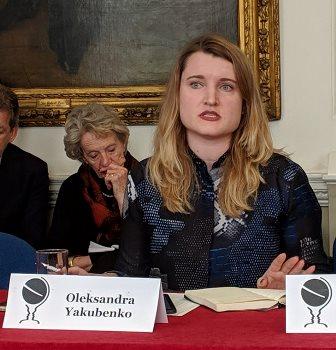
The Ukrainian Cultural Foundation has proved to be a real game-changer: its sizeable budget allowed it to fund nearly 300 projects last year, and 1,860 applications have been received in the first four months of 2019, reflecting the appetite and ambition of Ukraine’s artistic community, said Oleksandra Yakubenko, head of the International Cooperation Department at the Ukrainian Cultural Foundation (UCF). UCF’s budget for 2019 stands at 708 million hryvnas (£20 million).
Photo: Oleksandra Yakubenko, Head of the International Cooperation Department at the Ukrainian Cultural Foundation, at the Chatham House discussion.
The UCF is the first instance of Ukraine rolling out a grant-funding programme for culture, stretching across 8 different sectors. It now employs 70 staff and is cultivating a network of sectoral expert committees who evaluate projects according to a transparent points system. All applicants and all experts are listed on the UCF’s website, “a level of transparency with which even the British Council finds it hard to compete,” conceded Simon Williams.
This is a remarkable achievement, considering that only last year Ukraine’s community of artists and cultural managers ran riot after the announcement that First Lady Maryna Poroshenko would chair the UCF’s board. The claim that the UCF would end up in the pocket of the incumbent president has so far not received much traction, and nor has much proof been circulated. “We position ourselves as an organisation that stays away from politics. One of our core principles is that we do not support applications from political parties,” pointed out Oleksandra Yakubenko.
As the government issued a demand to cultural institutions to contribute to the development of the nation’s “patriotic education,” seen as essential in Ukraine’s ongoing conflict with Russia, the UCF also resisted the pressure of making “patriotic content” part of its strategy, a comprehensive document developed as a result of 11 brainstorming sessions, with 1,500 stakeholders involved. The strategy development became a powerful trust-building exercise, important for countries like Ukraine where trust in institutions is traditionally low.
Despite immense progress, effective development of arts and culture in Ukraine is still hindered by many factors.
But the new institution remains fragile and is wary of the changes that might come with a change of leadership: the presidency of Volodymyr Zelensky that now looks imminent might mean uncertain times for the Foundation and the entire identity project. Oleksandra Yakubenko reminded us that no future president can disband the UCF with a decree. As the UCF operates in accordance with Ukrainian law, then it can be disbanded only if the law is annulled, which is subject to the decision of the Parliament of Ukraine.
Despite immense progress, effective development of arts and culture in Ukraine is still hindered by many factors: an obsolete legislature, weak regional cultural infrastructure, an outdated education system in the liberal arts and a low level of trust towards state institutions.
Cultural relations in conflict
British Council has an impressive record in using cultural relations to mitigate the consequences of conflict. In Ukraine, this expertise is being deployed to the full. “Ukraine is not only a country in transition, but a country in conflict,” Simon Williams reminded us. British Council has been collaborating with grassroot activists and displaced universities and working to engage more than 1,000 school teachers close to the conflict zone, as they are often seen as figures of stability and agents of change in communities shaken by conflict, he explained.
Some 45,000 young Ukrainians have been involved in the Active Citizens project to date.
One of British Council’s largest projects is Active Citizens, nurturing leadership and activism among young people, teaching them skills in initiating community projects and developing their management skills. Some 45,000 young Ukrainians have been involved in the project to date. The UK government also funds projects aimed at media literacy and recognising malign intent, as these communities are subjected to powerful propaganda narratives from both sides of the conflict.
How does British Council manage to juggle so many objectives working in a society whose needs are so great? Simon Williams: “Our imperative is to find areas where we can see demand coming out of the civil society and where we can see that the UK has interesting experience. We’re not a development agency, we are a cultural relations organisation, so our purpose is to make those links with the UK. This narrows down our scope of work, but we also respond to demands and interests on the Ukrainian side.” Many challenges remain. Among them are “event-ism” and “helicopter-ism,” where too much focus is given to holding an event without following up in order for the changes to take root and become sustainable, Simon Williams conceded.
